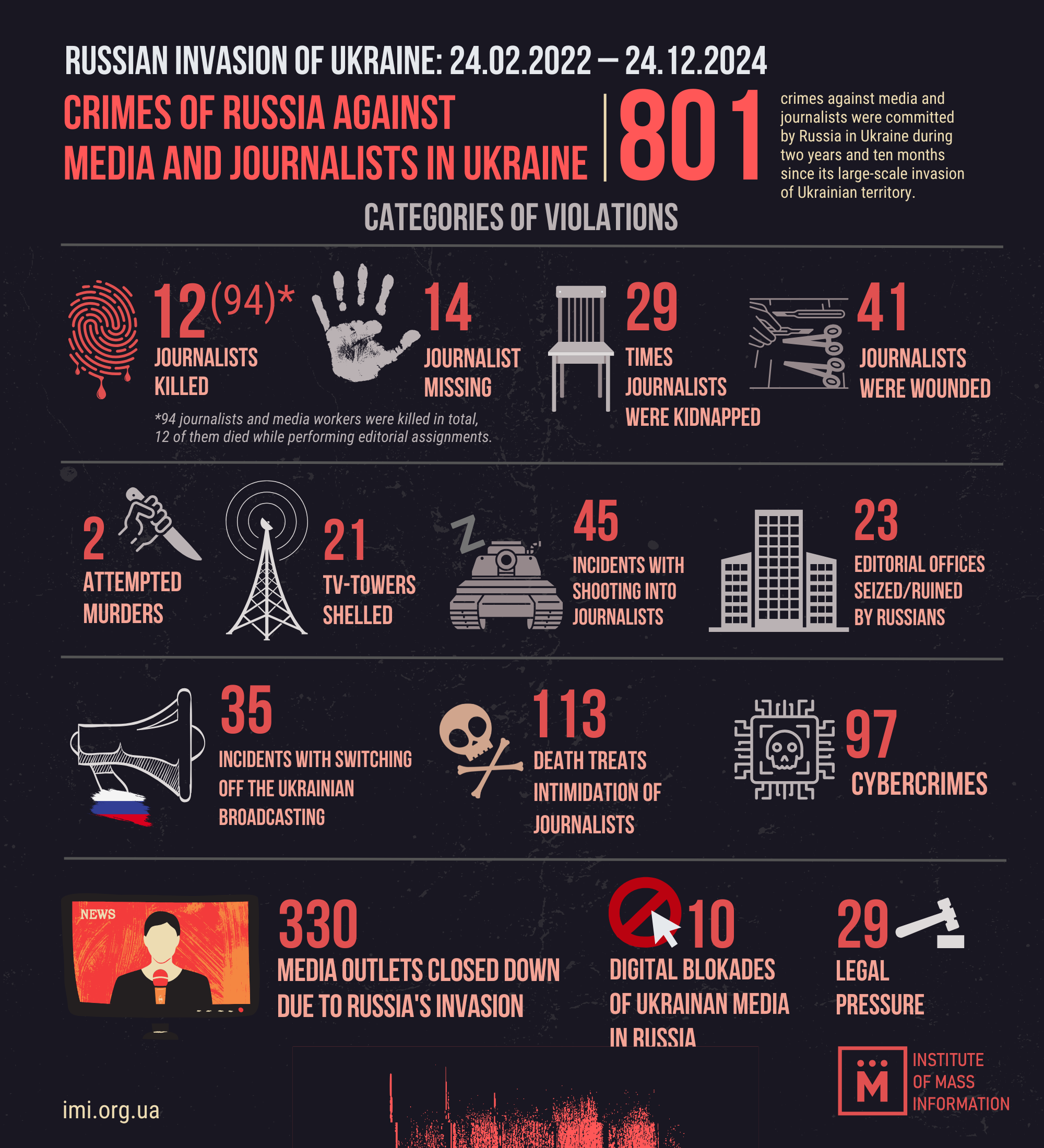In the 2 years and 10 months since the start of the full-scale invasion Russia committed 801 crimes against journalists and the media in Ukraine.
This is evidenced by the monthly monitoring study of Russia’s crimes against journalists and the media by the Institute of Mass Information.
In November–December 2024, the IMI recorded 39 crimes against the media and journalists committed by Russia. These included shelling strikes on journalists, death threats and intimidation, damage to media offices, legal pressure, cyber attacks, and a media outlet closing down due to the Russian invasion.
Two media professionals turned soldiers were killed in action during this period:
- Andriy Buchak, Luhansk journalist who had been fighting on the front line since 2014. Andriy Buchak went missing in action on August 13, 2024 near Vodyane village (Donetsk oblast). His death was reported by his wife Olena on November 24, 2024. In the 2000s, Andriy Buchak worked in the Luhansk newspaper Kuryer.
- Oleh Sarelo, soldier and film editor for the project Realna Istoria. His death was announced by his wife Olena on December 9, 2024. Oleh enlisted in the Ukrainian Armed Forces six months before. He served in the separate mechanized brigade No. 72.

Russia’s crimes against the media and journalists in Ukraine
Hromadske journalist Ksenia Savoskina and cameraman Oleksiy Nikulin were targeted by Russian drones while filming a news story near Kupyansk. The journalists were filming the evacuation of animals from the left bank together with the Kharkiv Animal Rescue initiative when they heard drone sounds. The Russians targeted their car, which caught fire. They had to hide from the drones several times. The journalists were unharmed.
Furthermore, a Russian shelling strike significantly damaged the pavilion where STB’s show MasterChef is filmed. There were no casualties.
Multiple media outlets and journalists received two waves of identical emails (on November 16 and December 12) claiming that bombs had been planted in the buildings of various institutions across Ukraine, as well as in the media offices. The emails arrived to both national and regional (Zaporizhzhia, Rivne, Volyn, Kropyvnytskyi, Poltava) media outlets.
Espreso TV sustained a cyber attack: the hackers gained unauthorized access to the channel’s server and attempted to stream a video clip parroting the Russian psyop narratives about Ukraine’s mobilization effort. Hackers also targeted a telecom provider and streamed pro-Russian clips on Ukrainian channels.
Chernihiv-based online media outlet Cheline also suffered a cyber attack: the website and the admin system went down. The team believes Russian hackers to be involved in the incident.
Russia arrested two foreign journalists and one Ukrainian reporter in absentia for reporting from Kursk oblast:
- France 24 journalist Catherine Norris Trent;
- DW journalist Nicholas Connolly;
- Hromadske journalist Diana Butsko.
Russia’s FSB had previously opened cases against them for illegally crossing Russia’s border.
Ukrainian media outlets continue to close down as a result of Russia’s aggression. In November, Zhytomyr-based Krok Radio, which had operated in the city since 2002, stopped broadcasting. The team says that the closure was mainly caused by financial difficulties and lack of staff, which were exacerbated by the start of the full-scale war.
Read the full monitoring here.
The Institute of Mass Information (IMI) is a Ukrainian non-governmental media organization that has been operating since 1996. The IMI defends the rights of journalists, analyzes the media field and covers media-related events, fights propaganda and disinformation and has been providing media outlets with safety gear for trips to the combat zone since the start of the Russo–Ukrainian war in 2014.
The IMI carries out Ukraine’s only freedom of speech monitoring and keeps a list of high quality and sustainable online media outlets, documents Russia’s crimes against the media committed in the course of the war on Ukraine. The IMI has representatives in 20 oblasts of Ukraine and a network of “Mediabaza” hubs to provide journalists with continuous support. The IMI’s partners include Reporters Without Borders and Freedom House; the organization is a member of the International Organization for the Protection of Freedom of Expression (IFEX).
